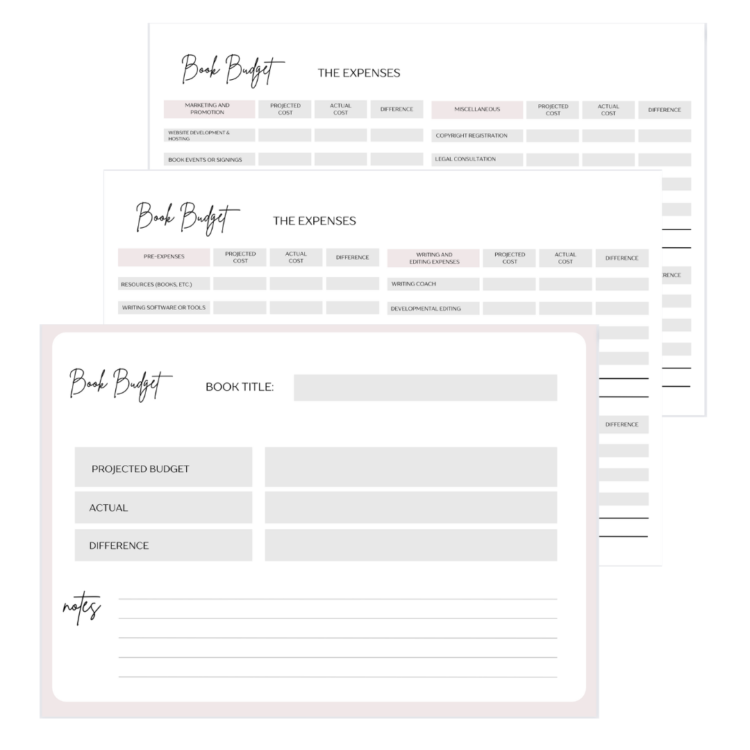
I. Introduction
Today, we’re diving into an essential topic that’s often overlooked but can make a world of difference in your publishing journey: how to publish a book on a budget. As a writing coach and author myself, I’ve seen firsthand how a well-planned budget can set you up for success and save you from unnecessary financial stress. So, grab your favorite beverage, and let’s explore the art of budgeting together!
Picture this: you’ve poured your heart and soul into your manuscript, and now it’s time to bring your literary masterpiece to life. But before you embark on this exciting adventure, let’s talk about the benefits of having a solid budget in place.
First and foremost, a budget helps you gain a clear understanding of the financial aspects involved in publishing your book. It’s like having a roadmap that guides you through the expenses you’ll encounter along the way. Trust me; this will save you from unexpected financial bumps and help you make informed decisions.
Now, for all you first-time authors out there, I know the idea of budgeting might seem daunting. But fear not! I’m here to break it down into simple, actionable steps that will empower you to take control of your book’s financial journey.
So, grab a pen and paper (or your favorite note-taking app), and let’s delve into the nitty-gritty details of creating a budget that works for you.
Ready to get started? In the next section, we’ll explore the different costs involved in the book publishing process, so you’ll have a clear picture of how to publish a book on a budget. Trust me; this knowledge will be your secret weapon as you navigate the exciting world of publishing.
Time needed: 15 minutes
II. Understanding The Costs
Before we dive into creating a budget, it’s crucial to have a solid understanding of the costs involved in publishing a book. By familiarizing yourself with these expenses, you can allocate your resources wisely and avoid any unpleasant financial surprises along the way.
- Editing Services: Every writer needs a fresh pair of eyes to review their work. Hiring a professional editor can make a significant difference in the quality and marketability of your book. While editing costs vary, it’s essential to budget for this crucial step.
- Cover Design: Don’t judge a book by its cover. Well, readers do! Investing in a professional book cover design is a worthwhile expense that will captivate your target audience and increase your book’s chances of standing out.
- Formatting and Layout: Ensuring that your book looks professional and is easy to read is essential. Formatting and layout services ensure that your book meets industry standards and offers an enjoyable reading experience.
- Printing and Distribution: If you plan to have physical copies of your book, consider the costs of printing, shipping, and distribution. Self-publishing platforms and print-on-demand services can make this process more accessible and cost-effective.
- Marketing and Promotion: Let’s face it—writing a book is just the beginning. To reach your readers, you’ll need to invest in marketing and promotion efforts. This includes activities like book launches, advertising, author websites, and social media campaigns. Allocate a portion of your budget for these essential activities.
- ISBN and Copyright Registration: Protecting your work is crucial. Budget for obtaining an ISBN (International Standard Book Number) and registering your copyright to ensure your book’s legal rights and distribution.
Remember, these are just a few of the common costs associated with book publishing. Depending on your specific needs and goals, there may be additional expenses to consider when it comes to how to publish a book. The key is to research and plan ahead, ensuring that your budget covers all necessary aspects of bringing your book to life.
In the next section, we’ll discuss practical strategies to create a budget tailored to your unique circumstances. Stick with me, and you’ll be well on your way to becoming a savvy budgeting author!
III. Assessing Your Resources
When it comes to creating a budget for your book, it’s essential to assess your available resources. This step involves taking a close look at both your financial and non-financial assets to determine how they can support your writing journey. Let’s dive into this crucial aspect of budgeting and explore some personal anecdotes along the way.

- Time: Time is a valuable resource for any writer. As a first-time author, you may be juggling multiple responsibilities such as a day job, family commitments, or other projects. Reflect on how much time you can realistically allocate to your book project each day or week. Consider establishing a writing schedule that works for you and stick to it. When I was writing my first book, I had a full-time job, was going to school, and had a child but I managed to write my book by staying up late each night. I prioritized writing by sacrificing a bit of sleep, and my dedication paid off in the end.
- Skills and Talents: Take an inventory of your skills and talents that can contribute to your book’s production process. Are you a talented designer or a skilled marketer? Leveraging your existing skills can save you money by allowing you to handle certain aspects of your book yourself. For example, with my most recent book, I used my graphic design skills to create an eye-catching front cover that perfectly captured the essence of my book. I did hire a freelancer on Fiverr to design the back cover, but by tapping into my abilities, I saved a significant amount of money and had full creative control over the cover design.
- Personal Network: Your personal network can be a valuable resource when it comes to budgeting for your book. Reach out to friends, family, or colleagues who might have relevant expertise or connections. They could provide valuable advice, recommend affordable service providers, or even offer their help for free. My friend was a graphic designer when I published books three and four, so I reached out to her for her expertise in website design as well as designing the book covers. Having my friend perform these services helped me to save money and gave me the confidence to navigate the publishing world more effectively.
- Financial Capacity: Assessing your financial capacity is crucial in creating a realistic budget. Determine how much you can comfortably invest in your book project without compromising your financial stability. This amount will vary for each individual, and being honest with yourself about your financial limitations is essential. While it’s tempting to go all-in, remember that responsible budgeting ensures the longevity of your writing career. Consider starting small and gradually allocating more funds as you progress.
Remember, every writer’s resources are unique, and there’s no one-size-fits-all approach. By honestly evaluating your time, skills, personal network, and financial capacity, you’ll gain a clearer understanding of the resources at your disposal. This knowledge will empower you to make informed decisions and allocate your resources effectively throughout the book creation process.
In the next section, we’ll discuss how to publish a book using practical strategies for allocating your budget to different aspects of your book project. Stay tuned!
IV. How To Publish A Book and Create Your Book Budget

Now that you have a clear understanding of the costs involved in publishing a book, it’s time to create a budget that works for you. A well-planned budget will not only help you manage your finances effectively but also ensure that you make the most out of your resources. Here are some practical steps to create your book budget:
- Assess Your Financial Situation: Start by evaluating your current financial standing. Determine how much you can realistically allocate towards your book project without causing any financial strain. Consider your income, savings, and other financial obligations to establish a reasonable budget range.
- Prioritize Your Expenses: Review the list of costs we discussed earlier and prioritize them based on their importance to your book’s success. For example, investing in professional editing and cover design may take precedence over other expenses initially. This way, you can allocate funds accordingly and adjust your budget as needed.
- Research and Compare Service Providers: Take the time to research different service providers and gather quotes for the various aspects of your book production. Don’t settle for the first option you come across. Instead, compare prices and quality to ensure you’re getting the best value for your money. Consider reaching out to other authors or writing communities for recommendations as well.
- Set Realistic Timeline and Milestones: Creating a timeline for your book project is vital, as it helps you determine when and how much money you’ll need at each stage. Break down your project into smaller milestones, such as completing the first draft, editing, cover design, and marketing. Assign a timeline and associated costs to each milestone, allowing you to track your progress and expenses effectively.
- Allocate Contingency Funds: It’s always wise to set aside some extra funds for unexpected expenses or emergencies that may arise during the publishing process. Unforeseen circumstances like additional revisions, changes in marketing strategies, or unforeseen production costs can occur, so having a safety net within your budget is essential.
- Monitor and Adjust Your Budget: Once you have your budget in place, it’s crucial to regularly monitor your expenses and adjust as needed. Keep track of your actual spending and compare it to your projected budget. This way, you can identify any areas where you may be overspending or where you can make adjustments to optimize your resources.
By following these steps and staying mindful of your budget, you’ll have a solid financial plan that supports your book’s success. Remember, budgeting is an ongoing process, so be open to making adjustments along the way.
In the next section, we’ll discuss cost-saving strategies that will help you to learn how to publish a book on a budget.
V. How To Publish A Book With Cost-Saving Strategies

Creating a budget for your book is just the first step. To make the most out of your resources and ensure the success of your project, it’s important to stay accountable and resourceful throughout the publishing journey. Here are some valuable tips to help you along the way:
- Track Your Expenses: Keep a detailed record of all your book-related expenses. This will help you stay on top of your budget and identify any areas where you may be overspending. Utilize budgeting tools or spreadsheets to maintain organized financial records.
- Seek Cost-Effective Alternatives: Look for ways to save money without compromising on quality. For example, consider joining writing communities or forums where you can find valuable resources and recommendations for affordable service providers. Explore cost-effective marketing strategies like social media promotion or collaborations with other authors.
- DIY When Possible: Embrace your creativity and tackle certain tasks yourself if you have the skills and time. Formatting your manuscript, designing simple graphics, or managing your website can save you money that would have otherwise been spent on outsourcing these services.
- Leverage Free and Low-Cost Resources: Take advantage of free or low-cost resources available to authors. Many online platforms offer access to royalty-free images, writing tools, and educational resources. Join writing groups or attend webinars and workshops to enhance your skills without breaking the bank.
- Stay Connected with Fellow Authors: Build relationships with other authors who are on a similar publishing journey. Sharing experiences and knowledge can lead to valuable insights and cost-saving strategies. You can exchange tips, collaborate on promotional efforts, or even consider joint ventures to maximize exposure and minimize costs.
- Review and Optimize Your Marketing Strategies: Regularly assess the effectiveness of your marketing efforts and adjust your strategies as needed. Monitor the return on investment for different promotional activities and focus on the ones that generate the most engagement and sales. This way, you can make informed decisions on where to allocate your marketing budget.
- Embrace Resourcefulness: Be resourceful in finding innovative solutions and opportunities. Look for grants, writing contests, or crowdfunding platforms that can provide financial support for your book project. Explore partnerships with local businesses or organizations that align with your book’s theme or target audience.
Remember, being resourceful doesn’t mean compromising on quality. It’s about finding creative ways to achieve your goals within your budget. By staying accountable and resourceful, you’ll maximize the impact of your budget and make your book publishing journey a rewarding and fulfilling experience.
VI. Monitoring and Adjusting Your Budget
You’ve now learned how to publish a book on a budget and how to harness your resources effectively. Here are some additional suggestions on how to monitor and adjust your budget:
- Embrace Flexibility: While having a budget is important, it’s equally important to remain flexible. Publishing a book is a dynamic process, and unexpected expenses or opportunities may arise along the way. By maintaining a degree of flexibility in your budget, you’ll be better prepared to adapt to changing circumstances.
- Regularly Review and Adjust: As you progress with your book project, periodically review and adjust your budget as necessary. Factors such as market trends, feedback from beta readers or editors, and new marketing opportunities may influence your financial plan. Stay open to making revisions that align with your evolving goals and needs.
- Seek Professional Guidance: If you feel overwhelmed or uncertain about managing your book budget, consider seeking the guidance of someone such as myself, a professional writing coach. I can provide expert advice tailored to your specific situation and help you navigate the financial aspects of your publishing journey.
- Take Action: Armed with the knowledge and insights gained from this article, it’s time to take action. Start by creating your book budget based on your estimated expenses, explore cost-saving strategies, and identify areas where you can optimize your resources. Remember, every step you take brings you closer to your goal of publishing a successful book.
Creating a budget for your book is a crucial step in your publishing journey. By carefully considering your expenses, exploring cost-saving options, and staying accountable and resourceful, you’ll have a solid foundation for bringing your book to life without breaking the bank.
VII. Seeking Professional Guidance

As you embark on your book writing and budgeting journey, it’s important to remember that you’re not alone. There are numerous resources and sources of support available to help you with how to publish. Here are some additional avenues you can explore:
- Writing Communities and Forums: Join online writing communities and forums where you can connect with fellow authors and exchange ideas, tips, and advice. These communities often have dedicated sections or threads where you can discuss the budgeting and financial aspects of book publishing.
- Writing Workshops and Courses: Consider enrolling in writing workshops or courses that cover various aspects of book writing, including budgeting. These programs can provide you with in-depth knowledge, practical techniques, and insights from experienced authors and industry professionals.
- Writing Conferences and Events: Attend writing conferences and events, both in-person and virtual, where you can network with other authors, learn from industry experts, and gain valuable insights into the publishing process. These events often feature sessions or panels on budgeting and finance for authors.
- Financial Planning Tools: Explore financial planning tools and software that can assist you in creating and managing your book budget. These tools can help you track expenses, set financial goals, and stay organized throughout the publishing process.
- Professional Writing Coaches and Consultants: Consider working with a professional writing coach such as myself, who specializes in helping authors with the budgeting and financial aspects of their book projects. I can provide personalized guidance, support, and accountability to ensure you stay on track with your budgeting goals.
Remember, building a successful book budget requires ongoing learning and adaptation. Stay curious, explore new resources, and seek support when needed. With the right mindset and strategic approach, you can navigate the financial aspects of your book project with confidence.
VIII. Conclusion
Congratulations on reaching the end of this guide on how to publish a book by creating a budget! By now, you should have a solid understanding of the key considerations, strategies, and resources involved in managing the financial aspects of your writing journey.
How To Publish Your First Book On A Budget
Remember, budgeting is not just about numbers and spreadsheets; it’s about setting realistic goals, making informed decisions, and aligning your financial resources with your creative vision. By taking the time to plan and track your expenses, you’ll have greater control over your publishing process and increase your chances of success.
As you move forward, keep these key takeaways in mind with regard to how to publish a book:
- Prioritize: Determine the essential components of your book project and allocate your budget accordingly. Focus on what truly matters and invest wisely in areas that will enhance the quality and reach of your book.
- Research and Comparison: Do your homework before making financial commitments. Explore different options, gather quotes, and compare prices for editing, cover design, and marketing services. This will help you make informed choices and potentially save money.
- Flexibility and Adaptation: Your budget is not set in stone. As you progress with your book, be prepared to adjust your financial plan based on unexpected expenses or new opportunities that arise. Stay open to changes and make necessary adjustments without compromising the quality of your work.
- Seek Support: Don’t hesitate to reach out for help and guidance. Whether it’s joining writing communities, attending conferences, or working with professionals, surrounding yourself with a support network can provide valuable insights, motivation, and accountability.
Remember, your book is not just a creative endeavor; it’s also a business investment. By treating it as such and approaching your budget with intention and mindfulness, you’ll set yourself up for a more enjoyable and successful publishing journey.
I wish you the best of luck with your writing and budgeting endeavors. Embrace the process, stay disciplined, and never lose sight of your passion. With determination and smart financial management, you’re well on your way to achieving your dreams as a first-time author. I hope this article was helpful in sharing how to publish a book on a budget.

Book Budget Worksheets
Are you a first-time writer and unsure how much it costs to publish a book? Are you looking for a way to keep track of your book expenses? Do you wish there was a simple and practical solution to help you navigate the financial challenges of publishing your book? Download my Book Budget worksheet to keep track of your budget and learn the expenses required to publish your book.


0 Comments